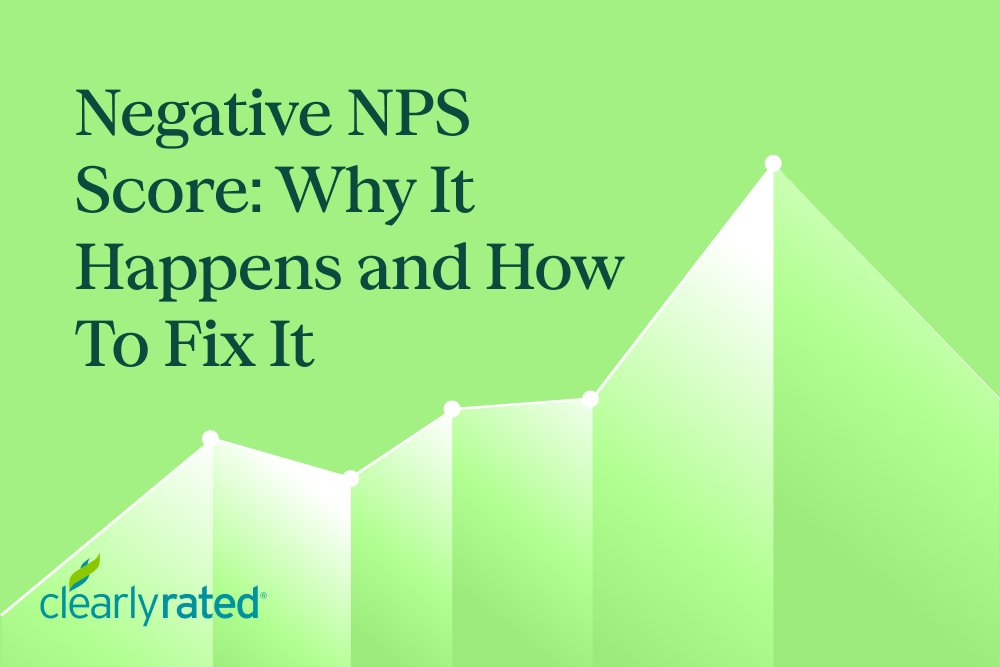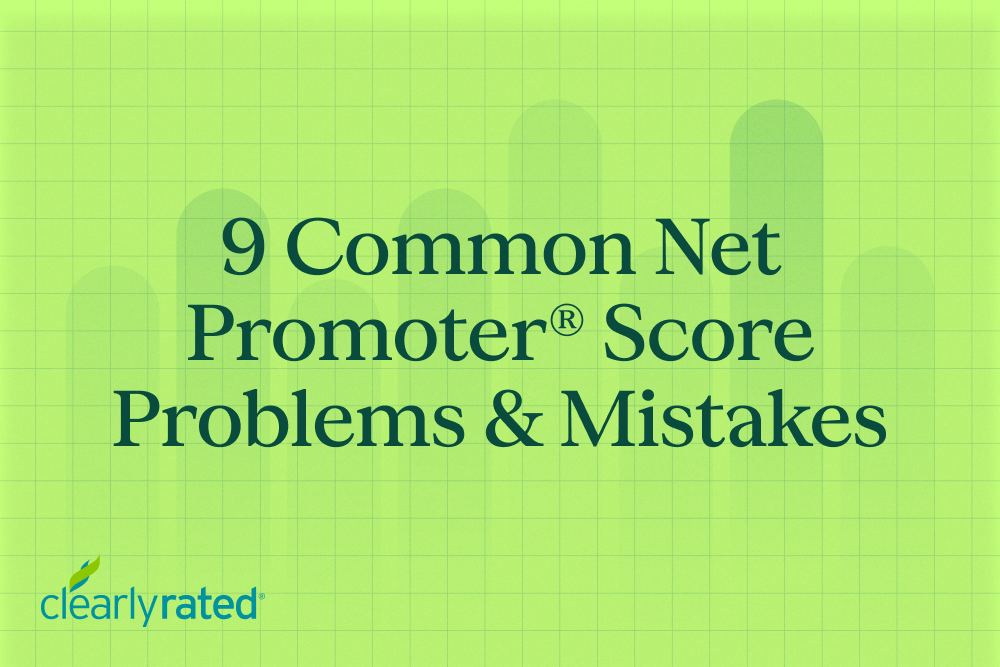NPS 101 for Legal Firms

- Legal firms lose clients not due to poor legal work but because of communication breakdowns and service gaps.
- NPS helps measure client loyalty and identifies areas where service can be improved to prevent client churn
- Regular NPS tracking enables firms to refine client communication, benchmark performance, and uncover growth opportunities
- Analyzing NPS by client type and legal service area reveals what’s working and what needs attention.
- Tools like ClearlyRated help firms collect feedback, act on insights, and retain at-risk clients through real-time follow-up.
Winning a case isn’t the only measure of success for a lawyer or law practice administrator. Clients expect clear communication, transparency in billing, and a legal team that respects their time. Yet, many firms lose clients, not because of poor legal work, but due to unanswered emails, long wait times, or unclear case updates. Trust is everything in the legal industry, and once it’s broken, clients rarely return.
The Net promoter score (NPS) for law firms offers a straightforward, reliable method to measure client loyalty and identify gaps in their services. A delayed response or a confusing legal process may seem small, but for clients, these moments define their experience. NPS provides real-time insight into how clients perceive your firm, so you can act before they leave.
In this article, we’ll explore how NPS works, why it’s critical for law firms, and how it can transform client feedback into meaningful action.
Understanding NPS in Legal Firms
Even if you haven't heard of NPS, you've likely answered an NPS survey before. It’s a simple but effective way to measure client sentiment.
For law firms, it offers a clear picture of how clients feel about their overall experience. Since NPS turns client feedback into a tangible number, it’s a direct reflection of your relationship with your clients, and whether that relationship is healthy or otherwise.
For example, when an internal legal matter is closed, law firms often ask clients one key question: “How likely are you to recommend our firm to a friend or colleague?”
Clients rate this on a scale of 0 to 10, with 10 being extremely likely and 0 being not likely at all. This rating helps assess their satisfaction and loyalty to your firm. Their answers fall into three groups:
- Promoters (9-10): These clients are fully satisfied with your firm. They trust your legal expertise, appreciate your service, and would recommend your firm to others. Their positive feedback strengthens your reputation and attracts new business.
- Passives (7-8): These clients are satisfied but not loyal. They may return for legal services, but they won’t actively refer your firm. If a competitor offers a better experience, they might leave.
- Detractors (0-6): These clients are dissatisfied. They may have experienced poor communication, unclear billing, or a legal process that felt impersonal. Not only are they unlikely to return, but they may also share negative feedback about your firm.
To calculate your firm’s NPS - we have a handy calculator here for just that - subtract the percentage of detractors from that of promoters. According to ClearlyRated's 2024 Legal Industry Benchmark Study, the average NPS for law firms is 37%. This figure has fluctuated over the years, indicating varying levels of client satisfaction across the industry.
For context, an NPS above 50% is considered excellent, while a score above 70% is deemed world-class. This suggests that many law firms have significant room for improvement in client satisfaction and loyalty.
A strong NPS correlates with increased client retention, positive word-of-mouth referrals, and overall business growth. Clients who rate their experience highly are more likely to return for future legal needs and refer others, directly contributing to the firm's revenue and reputation.
Conversely, low NPS scores for legal firms are a red flag. They can signal systemic issues, leading to client attrition and negative publicity. Perhaps communication is poor, or clients feel neglected or overwhelmed by the legal process. These service gaps could drive clients to seek alternatives.
Regularly monitoring and acting upon NPS feedback enables law firms to identify areas of improvement, improve client relationships, and differentiate themselves in a competitive market.
Why Legal Firms Should Track NPS
Client expectations in the legal industry have shifted. A strong reputation is no longer enough, and firms must measure and understand client satisfaction at every level.
Unlike traditional client feedback methods, NPS delivers quantifiable insights that help law firms refine their approach and remain competitive.
Here are some other reasons why legal firms should track NPS:
Client retention and loyalty
Legal services are often seen as a long-term commitment, and retaining clients can provide a steady stream of business over time. If clients are satisfied, they’re more likely to return to your firm for future legal matters. NPS helps law firms track exactly how loyal their clients are, offering insights into client retention that go beyond simple satisfaction.
For example, imagine a client returns to your firm for a second case after a positive experience with an initial matter. That client’s loyalty could stem from clear communication throughout the legal process, timely updates, and personalized service. NPS helps identify these strengths, so your firm can replicate them for future clients.
On the other hand, if a client feels their expectations weren't met in certain areas, such as receiving slow responses or poor case updates, they may hesitate to return in the future. NPS helps identify and address these service gaps before they cause clients to look elsewhere.
For law firms that handle ongoing business contracts, estate planning, or corporate litigation, client retention directly impacts revenue. The more satisfied a client is, the more likely they are to return for additional legal support rather than seek another firm.
Gaining referrals and new clients
In the legal industry, referrals are often the most valuable form of marketing. Many potential clients turn to friends, family, or colleagues for recommendations when seeking legal representation. NPS scores directly influence your firm’s ability to gain referrals. In fact, research suggests that referred customers make more purchases and generate an average of 30-57% more new customers than other clients.
For example, a client who has a successful experience working with your firm on a personal injury case is likely to refer friends or family members facing similar challenges. A high NPS score signals that these clients are happy to promote your firm. By tracking NPS, you can identify promoters and actively encourage them to refer others, knowing that satisfied clients are the most reliable source of new business in the legal industry.
Moreover, NPS data helps you understand what exactly prompts clients to make those referrals. Is it:
- Your firm’s customer service?
- The way you handle communication and billing?
- The way your attorneys explain complex legal terms?
Knowing the elements that encourage clients to refer you can guide your firm in creating a more referral-friendly experience for new clients.
Benchmarking against competitors
NPS for legal firms provides a standardized way to compare client satisfaction levels against industry benchmarks in a crowded market. Firms with a higher NPS than their competitors gain a competitive edge, signaling strong client relationships.
ClearlyRated’s benchmark study suggests that the legal industry's NPS is down 5 percentage points from 2022. However, it has historically had a higher NPS, with the exception of 2016-2018 when the industry’s NPS was less than 25%. Monitoring these shifts can help your firm stay competitive by assessing your performance against the broader market.

Internal comparisons can also provide valuable insight. NPS allows firms to evaluate client satisfaction across different practice areas, departments, and even individual attorneys. A well-managed NPS program highlights top performers and identifies areas in need of improvement, offering a roadmap to enhance client relationships and service delivery.
How to Measure NPS for a Legal Firm
For law firms, accuracy in measuring NPS is crucial, as legal services often involve high-stakes, complex cases, and long-term client relationships. A well-structured approach ensures the data reflects genuine client sentiment and provides clear direction for improvement.
1. Define the right client touchpoints
Not every client interaction is the right moment to ask for feedback. Law firms should identify key touchpoints where clients can accurately assess their experience. This could be after a case resolution, contract completion, or estate planning consultation.
For ongoing matters, such as corporate legal services, conducting periodic NPS surveys (e.g., quarterly or annually) allows firms to track long-term satisfaction trends and ensure that service delivery remains consistent.
2. Build a clear and concise survey
An effective NPS survey for legal teams should be straightforward and respect the client’s time. The core question remains:
"On a scale of 0 to 10, how likely are you to recommend our firm to a colleague, friend, or business associate?"
This numerical rating provides a clear, standardized metric to gauge client satisfaction, but numbers alone don’t tell the full story. Law firms benefit from adding an open-ended follow-up question:
"What was the primary reason for your rating?"
This combination delivers both quantitative data and qualitative insights, crucial for understanding client sentiment. The score highlights overall satisfaction trends, while client comments uncover specific pain points or standout experiences.
To simplify this process, firms should use NPS survey software that integrates with existing systems and automates follow-ups. This prevents missed feedback opportunities while keeping engagement consistent. Syncing NPS data with a CRM allows firms to track responses over time, identify patterns, and make data-driven service improvements.
Platforms like ClearlyRated specialize in legal client feedback and reputation management, helping partners strengthen key relationships. Our tailored B2B surveys allow firms to:
- Customize questions by practice area or case type to gather relevant insights
- Control survey scheduling and frequency to prevent client fatigue
- Benchmark satisfaction levels within practice groups, identifying areas for improvement
- Identify cross-selling opportunities by tracking client needs across services
By leveraging these tools, law firms can prevent client churn, support succession planning, and uncover growth opportunities, without adding complexity to partners' schedules.
3. Choose the right survey method
Law firms should select a survey method that suits their client base. Email surveys are the most common, as they offer convenience and allow clients to respond at their own pace.
However, high-net-worth clients or corporate clients may prefer a more personalized approach, such as a follow-up call or a survey embedded in a secure client portal.
4. Analyze the results by client type and practice area
Aggregating all responses into a single NPS score is useful, but breaking it down by client segment is even more valuable. A law firm should analyze NPS by practice area (e.g., litigation, family law, corporate law) and client type (individuals vs. businesses).
This level of detail highlights which areas of the firm deliver exceptional service and where improvements are needed.
5. Take action based on insights
Measuring NPS without acting on it defeats the purpose. If a firm sees a drop in its score, leadership should review client comments, identify trends, and implement targeted improvements. This could include revising communication protocols, improving response times, or addressing service gaps.
Similarly, if corporate clients express concerns about slow response times, workflow adjustments may be needed. If family law clients feel disconnected during proceedings, better client communication protocols should be introduced.
6. Track changes over time
A single NPS score doesn’t define a firm’s success—long-term trends do. By consistently measuring NPS at regular intervals, law firms can assess whether their initiatives are leading to higher satisfaction and more referrals.
Comparing NPS over months or years helps firms measure the effectiveness of operational changes, identify long-term trends, and ensure their strategies are continuously aligned with client expectations.
Interpreting Your Law Firm’s NPS Score
An NPS survey reveals how clients truly see your firm, not just in theory, but in action. It shows whether they trust your team, feel valued, and would recommend your services.
Law firms often score lower than consumer-facing businesses, so comparisons should be made within the legal sector.
- 70 and above – Exceptional. Clients are highly satisfied and likely to recommend your firm
- 50 to 69 – Strong, but with room for improvement. Identify what’s working and refine weaker areas
- 0 to 49 – Mixed feedback. Some clients are happy, but others have concerns that need attention
- Below 0 – High dissatisfaction. Immediate action is necessary to repair trust and improve client experience
To unlock the full potential of your NPS score, focus on analyzing the feedback provided with it. The NPS score tells you the overall sentiment, but the feedback reveals why clients feel that way.
Here’s how you can analyze the client feedback:
- Identifying recurring themes in client feedback: Look for common feedback across multiple clients. If similar issues arise in your family law or corporate practices, address those areas specifically.
- Segmenting feedback based on client type: Analyze responses from different client groups, such as corporate clients vs. individual clients. Corporate clients may focus on billing transparency, while individuals might value personalized attention more.
- Analyzing feedback by practice area: Break down feedback by legal service areas such as family law, litigation, or estate planning. Clients in different areas will have unique expectations and concerns.
- Tracking feedback trends over time: Monitor whether changes in your firm, such as billing adjustments or service improvements, affect your NPS scores. A drop in scores can signal the need for reevaluation.
- Involving attorneys and staff in feedback analysis: Engage with attorneys and staff who interact with clients daily. Their insights can help contextualize feedback and reveal specific areas where clients might be dissatisfied or pleased.
Improving NPS in a Legal Firm
Improving your law firm’s NPS score is not a one-time task but a continuous journey. A good NPS score means your clients feel valued, trust your services, and would recommend you to others.
However, to see real improvement, law firms need to focus on key areas that directly impact the client experience. Below are some strategies that can help you improve the overall experience and, in turn, your NPS.
Enhancing client communication
Effective communication is the backbone of a positive client relationship. In a legal setting, where emotions can run high and uncertainty often exists, how your firm communicates can make or break a client’s experience.
Simple gestures like keeping clients updated on case progress or ensuring they understand the steps ahead can go a long way in building trust. When clients don’t feel left in the dark, they’re more likely to feel confident in your firm’s abilities and will rate their experience higher.
Moreover, communication should not be limited to just one method. Some clients prefer emails with detailed updates, while others may want to discuss matters over the phone. Offering flexibility and responsiveness shows your firm’s commitment to meeting clients where they are.
Delivering exceptional legal services
Winning cases matters, but so does the client's experience. Legal matters are stressful, and clients seek reassurance throughout the process.
Take time to listen to their concerns. In family law cases, explain the emotional and legal steps involved in divorce or child custody proceedings. For corporate clients, clarify the legal intricacies of mergers or intellectual property protection. Simplifying complex legal terms helps clients feel more in control and less overwhelmed.
Keep clients informed about timelines and case progress, tailoring your approach to each case so they feel their matter is handled with care and attention to detail. For example, in litigation, inform clients of key milestones—such as filing motions or court hearings— and explain what these steps mean for their case.
Addressing negative feedback effectively
No firm is perfect, and negative feedback is bound to happen. But how you handle that feedback can either make or break your reputation. The key is to address concerns with understanding and a willingness to improve.
If a client expresses dissatisfaction with the service they received, don’t dismiss it. Instead, listen closely, ask questions to understand the core issue, and show that you're committed to finding a solution.
When handled correctly, even a negative experience can strengthen client relationships.
Legal Industry Benchmarks for NPS
Determining what qualifies as a "good" NPS score for your law firm depends on several factors. Here’s how to assess where your firm stands:
- Global NPS standards: In general, a score of 50% is considered "excellent," while a score of 70% or higher is regarded as "world-class."
- Industry comparisons: The 2024 Legal Industry NPS Benchmark is 37%. Law firms that are recognized as service leaders, such as the winners of the 2025 Best of Legal award, achieved an average NPS of 70%.
- Cross-industry benchmarks: Looking at NPS scores across industries can provide additional context. For instance, ClearlyRated's Annual Survey Benchmark Study for the IT services sector recorded an NPS of 55% in 2024
These comparisons help establish where your firm’s NPS stands relative to others in both the legal sector and beyond.
Real-World Example of NPS in Legal Firms: Lewis Roca + ClearlyRated
Lewis Roca, a U.S.-based law firm, had strong client relationships but lacked a measurable way to track and improve client satisfaction. Their existing process (partner-led relationship reviews) provided insights but wasn’t scalable or actionable. They needed quantifiable client feedback to assess their service model, Experience Amplified, and identify areas for improvement.
Lewis Roca partnered with ClearlyRated to implement an NPS-based client survey. The survey:
- Standardized client satisfaction measurement using NPS benchmarks
- Identified key drivers of satisfaction and dissatisfaction
- Provided real-time feedback to attorneys for immediate action
A key priority was attorney buy-in, ensuring survey results were understood and acted upon.
The results were phenomenal. They:
- Retained at-risk clients: One client flagged a billing issue in their survey response. The attorney followed up immediately, resolved the issue, and secured two new matters.
- Increased engagement: Attorneys used feedback to proactively strengthen client relationships.
- Data-driven improvements: The firm now has clear metrics to track service quality and refine their client experience strategy.
Following the success of their first NPS survey, Lewis Roca is expanding the initiative to further integrate client feedback into business decisions.
Leverage ClearlyRated as a Solution for Your Law Firm
NPS is a strategic tool that connects your legal team with the firm’s goals, making sure each action drives collective success. It provides invaluable insights into client satisfaction, enabling you to refine service offerings, boost retention, and drive growth.
With ClearlyRated’s tailored solutions, you can efficiently gather client feedback, benchmark against industry standards, and proactively address any issues. By tracking satisfaction across practice areas and offices, you’ll strengthen client relationships, uncover cross-selling opportunities, and showcase your firm’s excellence through client testimonials.
Start using the NPS today to elevate your law firm’s client experience and stay ahead in a competitive market. Book a free demo with ClearlyRated to get started!
FAQs
How often should legal firms measure NPS?
Law firms should measure NPS at key touchpoints in the client journey. A good practice is to send surveys after case resolution, at major milestones, or annually for ongoing clients. Frequent tracking helps firms identify trends and address issues before they escalate.
What is the ideal NPS survey question for a law firm?
The core question remains: "On a scale of 0 to 10, how likely are you to recommend our firm to a colleague, friend, or business associate?" A follow-up question like "What was the primary reason for your rating?" provides deeper insight into client sentiment.
Can a low NPS score be improved quickly?
Raising NPS takes time, but immediate steps can show clients their feedback matters. Address complaints directly, improve response times, and refine communication. Consistently delivering reliable legal guidance and demonstrating client care leads to long-term improvements.
How does NPS compare to other client satisfaction metrics?
NPS focuses on client loyalty, while metrics like CSAT (Customer Satisfaction Score) measure short-term satisfaction. Client Effort Score (CES) evaluates ease of service interactions. Using NPS alongside these metrics provides a well-rounded view of client experience.
Should small law firms also track NPS?
Yes, client loyalty is critical, regardless of firm size. A strong NPS helps small firms understand client needs, improve service, and compete with larger firms. Even a small number of promoters can lead to valuable referrals and long-term growth.
FAQs





.png)


%20(1).png)

.webp)
.png)






%5B1%5D.webp)







.png)











_%20The%20Ultimate%20Guide.png)





.png)




















%20in%20the%20Workplace.png)









.png)

%20and%20how%20can%20you%20increase%20it.png)
_%20A%20Step-by-Step%20Guide.png)

.png)
.png)




_.png)



%20in%202028.png)


_%20The%20Ultimate%20Guide%20(2024).png)






